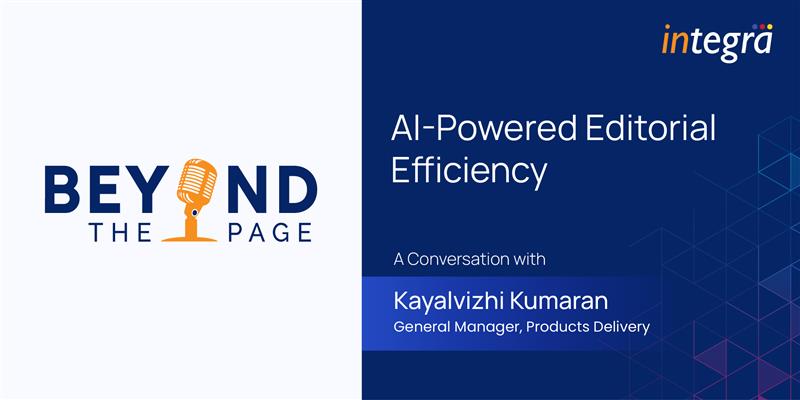Handling Multiple Contributors—Successful Editorial Management

With digital taking the world by storm, you’d be living under a rock if you still believe that publishing remains unaffected by the digital wave. Be it publishing huge volumes of academic research, journals, a voluminous book, or whitepapers or regular blogs that steer content marketing efforts in B2B and B2C environments, the digital bug has bitten quite strongly and how!
Publishing in the digital environment brings a unique set of characteristics to the entire publishing process and calls for a more structured approach to editorial management. People no longer see publishing as a linear, straightforward process akin to factory line production. Back in the day, an editor handling a multiple-contributor piece of work needed to do the grunt work of getting every author on the same page to ensure the entire volume of work meets the production schedule. But that was a thing of the past! The work landscape in a digital publishing context seems highly dynamic and collaborative, and editorial management has become an entirely different ballgame altogether.
As the digital publishing landscape evolved, the concept of content management systems came into being. And not much later, software solutions to manage and deliver training and learning content started gaining popularity and they were called. Premised on collaborative activity, a learning management system allows different types of content to come together with traceable paths and history. With technology such as AI and advanced algorithms playing a significant part in the digital avatar of the publishing process, specific functions can be automated with content being simultaneously published in multiple locations with full customization for different users.
As exciting as this prospect sounds, the challenge lies in successful editorial management. Managing contributions from multiple authors working across different geographies with unique working styles is quite a task! Compounding this further is the consistent need to keep track of each contributor’s progress, staying sane amidst exhaustive feedback loops and multiple review cycles—all with the looming goal of timely and high-quality publishing. Seems like a double-edged sword, doesn’t it?
Well, fret no more! We may have some possible answers to these gnawing issues to make editorial management a less stressful activity.
1. Technology to the Rescue!
Quite often, digital publishing for any form of content necessitates multiple editors coming together to complete a task or activity, and the key here lies in streamlining the collaborative efforts for impactful publishing. Cloud-based solutions address this need by providing tools built with the capability to track usage and results along with smart editing tools that accommodate collaborative working styles and provide real-time alert notifications to editors and authors in order to keep pace with the editorial workflow.
Given that collaboration doesn’t follow a linear pattern, there is bound to be a lot of back and forth in the whole process. On the surface, it might seem that a simple word processor is the best platform for tracking changes, but it’s not handy with collaborating, mostly because you have to attach the document—the newest version of the document—to an email every time it switches hands. This complicates the already dreadful exercise of version control. That’s why it’s best to create some other system for editing and collaborating with multiple contributors.
2. Define a Workflow and Optimize It
Explore tools and platforms that enable you to define specific workflows categorized by themes and topics. Organize and assign tasks and set deadlines for authors, editors, and other content creators. Add job notes, version numbers, document details, and email notifications to keep communication lines open and easy. Organizing your workflow with a detail-oriented focus allows your authors to get to the task at hand immediately and take it through completion. Based on your specific requirements, figure out what works best for you. To enhance quality within your workflow, take to automation via AI and NLP-powered tools. Smart publishing tools such as iLancer, iPMP and iCorrectProof leverage automation to drive efficiency, reduced time to manage collaboration, and improved reviewing capabilities thereby bringing down operational costs and reducing workload and errors.
3. Swear by Style Guidelines
Imagine, if you as an editorial manager, have to spend a lot of time in making edits to bring consistency of tone, voice, and style for every author/stakeholder involved in the publishing process. How do you address this challenge: By creating an exhaustive list of guidelines that contributors can refer to, before they begin writing. A style guide can act as the common frame of reference or an acknowledged rulebook that contributors can fall back on for questions of grammar, spelling, punctuation, capitalization, and usage. Tools available today use NLP to automate a series of first-level style guidelines in cases where manual style guides are not adhered to. With the use of various statistical algorithms, NLP determines various categories or classes of similarity and the classification can be explained as the process by which various instances are clustered together into various classes (or groups) on the basis of specific attributes. You can choose to either develop an in-house style guide based on your niche requirements or follow a widely accepted and established style guide like the AP Stylebook.
4. Create a Best Practices Document
Along the same lines of a style guide, a best practices document extends beyond style nuances and offers contributors insightful understanding into your audience personas, your business focus, and a high-level overview of your core industry. The best practices document ideally includes samples of previously accepted and published as useful reading references.
5. Build a Core Group of Contributors
Establish a rapport with successful authors, writers, subject matter experts, to build a core group of contributors. You can do this right from the start in order to nurture expert contributors to be invested in you. Taking this approach saves you time in terms of establishing a working relationship with them, but also this activity inherently has the ability to build loyalty with your contributors. This way it is possible to engage with a reliable set of authors / writers who prefer to work with you, which in turn will provide you as an organization to deliver consistently high quality content.
As a good-to-have, provide a discussion forum for your contributors to have them exchange inputs with one another to foster a sense of community, as well as maintain a steady network of trustworthy contributors.
How Integra Helps Accomplish Seamless Editorial Management!
Integra’s iAuthor platform helps effectively manage collaborative content authoring and editing by multiple stakeholders across the globe in real time. As a cloud-based solution, iAuthor harnesses the power of Natural Language Processing (NLP) and Artificial Intelligence (AI) helping publishers achieve rapid release cycles from manuscript processing to delivering print-ready PDFs or multiple e-formats, ready for distribution.
Integra’s NLP-driven iCorrectProof offers on-the-cloud proofing and author correction management to deliver results such as reduced turnaround times and an absolute ease of navigation. With XML at the back-end and supporting user-friendly editing functions and real-time status updating, iCorrectProof steers seamless editorial management quite efficiently.
Ever since its inception, Integra has been known for expediting publication turnaround time, increasing efficiency and saving costs for industry leaders in the digital publishing space.
Recent Blogs

Strategic Standards Alignment in K–12 Education through Smart Content and Intelligent Infrastructure



